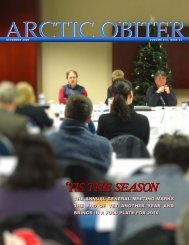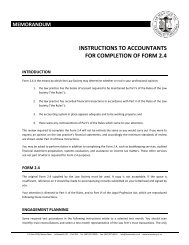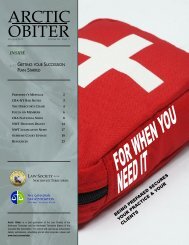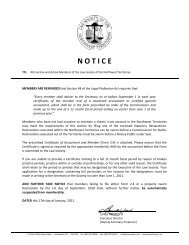ARCTIC OBITER
March/April 2013 - Law Society of the Northwest Territories
March/April 2013 - Law Society of the Northwest Territories
- No tags were found...
You also want an ePaper? Increase the reach of your titles
YUMPU automatically turns print PDFs into web optimized ePapers that Google loves.
community, it may not be possible<br />
to deal with aboriginal offenders<br />
any differently than with nonaboriginal<br />
offenders. When<br />
someone repeatedly commits<br />
serious offences that harm fellow<br />
community members, which in<br />
this jurisdiction are often other<br />
aboriginal people, the different<br />
approach that the court has to<br />
consider using in dealing with<br />
aboriginal offenders cannot result<br />
in the imposition of sentences<br />
other than jail terms if that is what<br />
is required to protect the public. In<br />
this case, there were five previous<br />
instances where the offender got<br />
into a home without permission<br />
and was found in the bedroom or<br />
doorway of the bedroom of a<br />
sleeping woman or young girl.<br />
The paramount sentencing<br />
consideration has to be the<br />
protection of the public. The<br />
present offence was committed<br />
within months of his last release<br />
from jail.<br />
~<br />
CIVIL PROCEDURE – EXPERT<br />
EVIDENCE<br />
Anderson v Bell Mobility<br />
2013 NWTSC 14 (March 11, 2013)<br />
Presiding: Justice R.S. Veale<br />
For the Applicant/Defendant: R. Deane, B. Dixon<br />
For the Respondent/Plaintiffs: K. Landy, D. Fogel<br />
The defendant brought an<br />
application under Rule 278.6,<br />
objecting to the admissibility of the<br />
plaintiffs’ expert evidence. The<br />
plaintiffs proposed to call, as an<br />
expert witness, a researcher from a<br />
telecommunications focused<br />
research group.<br />
Application dismissed – Expert<br />
evidence is presumptively<br />
inadmissible unless the party<br />
tendering it can establish its<br />
admissibility on the balance of<br />
probabilities. Even if the Mohan<br />
preconditions are met, the trial<br />
judge as gatekeeper has discretion<br />
that involves a cost benefit<br />
analysis. In this case the expert<br />
opinion of the proposed witness is<br />
admissible because it has sufficient<br />
threshold reliability and it is<br />
relevant. It is necessary to assist<br />
the trier of fact, as it is beyond the<br />
experience of any trial judge. No<br />
exclusionary rule has been<br />
identified and the witness is<br />
suitably qualified.<br />
~<br />
CRIMINAL LAW – SENTENCING<br />
– TRIAL JUDGE’S DUTY WHEN<br />
SENTENCING OUTSIDE THE<br />
PROPOSED RANGE – FAILURE<br />
TO REFER TO GUILTY PLEA –<br />
IMPOSITION OF MAXIMUM<br />
SENTENCE – CONSIDERATION<br />
OF GLOBAL SENTENCE<br />
R v Bugghins<br />
2013 NWTSC 16 (March 20, 2013)<br />
Presiding: Justice V.A. Schuler<br />
For the Appellant: C. Jarock<br />
For the Respondent: M. Johnson<br />
The appellant appealed his<br />
<strong>ARCTIC</strong> <strong>OBITER</strong> MARCH/APRIL 2013 ■ 23
















